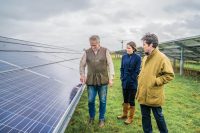Farm diversification guide: What farmers need to know

13th March 2019
-
Stuart Coombe See profile
Diversification has been a buzzword for farming businesses for years, and we have worked with many clients who have taken the opportunity to move away from traditional farming and develop their business into other areas.
The main aim of diversification is to build an income stream and ‘off-farm’ capital that can complement the running of a successful farm, providing added security at times when farming goes through a dip.
What diversification opportunities for farmers are there?
The good news is that there are various ways in which you can diversify your income streams, splitting risk and securing your farm’s future. These include:
- Holiday lets
- Caravan parks
- Lodge parks
- Property development
- Cafes
- Retail
- Solar power
- Food production
Venturing into alternative business areas can enable you to accumulate additional wealth that can help with matters such as succession planning and retirement issues.
According to a 2017 Defra survey, it’s a move that more than 60% of farming businesses in the UK have now taken.
But it’s important to remember there are no guarantees that diversification will result in increased profits, and you need to carefully consider whether it’s the right move to create a sustainable business.
5 things you should consider before diversifying your farm
Below are four key tax and accountancy issues which could help you to make that decision, as well as an alternative route using traditional financial planning to generate reserves which can protect your family farming business.
1. Securing funding & grants
You can have the best business idea in the world, but it won’t be much good if you can’t secure the necessary funding. Working closely with your accountant to produce a robust and forward-thinking business plan will be invaluable when it comes to talking to your bank about your financial requirements.
It’s also important to explore the various grants that might be available, as these change regularly and can often provide a large chunk of the money you need to fund a new venture.
2. Limiting your liability
If diversifying means you will increase your dealings with the wider general public, you may want to think about incorporating a limited liability company.
This will prevent you being held personally liable for any claims that could be brought against the business – and the costs of failing to do so can be horrendous.
3. VAT
Setting up a different venture with your farm can often lead to a larger number of exempt supplies being made – especially, for example, when diversifying into holiday lets – which can then result in partial exemption issues for VAT purposes.
It’s an area that HMRC scrutinise closely, so it’s important to fully consider the VAT implications of diversifying, and avoid the potentially large penalties that can arise.
4. Inheritance Tax
Farmland used for agricultural purposes will generally be exempt from Inheritance Tax (IHT) as it qualifies for Agricultural Property Relief (APR).
But a change of use could see that APR removed; while in some cases Business Property Relief will cover the additional value arising from the change, the IHT implications do need to be taken into consideration.
5. Smarter financial planning
Farming businesses can also use smarter financial planning to build off-farm assets in a more traditional way. While there is a tightening tax regime, there are still many things you can do to build your wealth and accumulate reserves that can then be used to assist the farm business, or to top-up personal income in later years.
One simple step is to build tax-efficient reserves such as Individual Savings Accounts (ISAs) and pensions, to ensure there are funds available as an alternative income stream for the farm.
As well as potentially lowering current and future tax bills, this will also give you access to highly liquid and easily realisable funds which can be more easily adapted to your changing circumstances. Those assets can be professionally managed, and provide higher levels of growth over a medium to long term.
Larger diversification projects can also involve significant capital. Putting money aside in investment vehicles doesn’t require large sums; you can start saving regular, modest amounts to begin building up off-farm assets, topping up as and when finances allow.
Diversifying your farm business could be the perfect next step for you but, as with all big ventures, you will need to make sure you have thought everything through to really maximise your chances of success. We can work closely with you to advise on the best diversification plan for your business, and to advise you on how to integrate and manage your personal finances. If you would like to talk it through further with one of our specialist farming advisers, then please get in touch.



